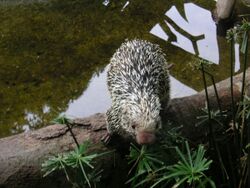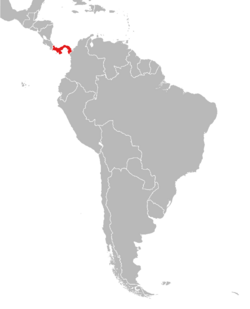Biology:Rothschild's porcupine
| Rothschild's porcupine | |
|---|---|

| |
| Scientific classification | |
| Domain: | Eukaryota |
| Kingdom: | Animalia |
| Phylum: | Chordata |
| Class: | Mammalia |
| Order: | Rodentia |
| Family: | Erethizontidae |
| Genus: | Coendou |
| Species: | C. rothschildi
|
| Binomial name | |
| Coendou rothschildi (Thomas, 1902)[2]
| |

| |
| Synonyms | |
|
Coendou quichua | |
Rothschild's porcupine, Coendou rothschildi, is a species of rodent in the family Erethizontidae.[3] It is usually considered endemic to Panama. A population in western Ecuador belongs either to this species or to Coendou bicolor. Because of the confusion over its taxonomic status and because its ecology is little known, the IUCN has listed its conservation status as "data deficient".
Taxonomy
Mammal Species of the World treats Coendou rothschildi as a valid species endemic to Panama but states that it is possibly a subspecies of the bicolored-spined porcupine (Coendou bicolor).[3] The International Union for Conservation of Nature lists the species as a synonym of the Andean porcupine (Coendou quichua) and states its distribution to be Colombia and Ecuador.[1]
Description
Rothschild's porcupine is a medium-sized porcupine with a head-and-body length of between 332 and 420 mm (13.1 and 16.5 in) and a tail length of between 290 and 413 mm (11.4 and 16.3 in). A fully grown adult weighs in the region of 2 kg (4 lb). The nose is pink and large, and the eyes are small. The body is spiny all over, the evenly spaced spines being dark with yellowish tips in the animal's mid section. The tail tapers from a broad base and is prehensile.[4] This porcupine could be confused with the Mexican hairy dwarf porcupine (Sphiggurus mexicanus), but that species has long black hair which largely conceals the spines while Rothschild's is more obviously spiny.[4]
Ecology
The ecology of this species is little known. Its behaviour is likely to resemble that of its close relatives in being nocturnal and arboreal, and feeding on fruit and leaves.[4]
Status
Rothschild's porcupine is listed by the International Union for Conservation of Nature as "data deficient". This is because of its uncertain taxonomic status as well as the lack of recent information on its abundance, the threats it faces and its needs. It is generally an uncommon or rare species and it is suspected that its population is decreasing, due to degradation and fragmentation of its habitat as the forest is felled for conversion to agricultural use.[1]
References
- ↑ 1.0 1.1 1.2 Samudio, R.; Timm, R. (2008). "Coendou quichua". IUCN Red List of Threatened Species 2008. https://www.iucnredlist.org/details/136702/0. Retrieved 30 June 2016.
- ↑ Biolib.cz
- ↑ 3.0 3.1 Woods, C.A.; Kilpatrick, C.W. (2005). "Infraorder Hystricognathi". in Wilson, D.E.; Reeder, D.M. Mammal Species of the World: A Taxonomic and Geographic Reference (3rd ed.). Johns Hopkins University Press. p. 1547. ISBN 978-0-8018-8221-0. OCLC 62265494. http://www.departments.bucknell.edu/biology/resources/msw3/browse.asp?id=13400104.
- ↑ 4.0 4.1 4.2 Reid, Fiona (2009). A Field Guide to the Mammals of Central America and Southeast Mexico. OUP USA. pp. 245–246. ISBN 978-0-19-534322-9. https://books.google.com/books?id=aBEbUaXTWYAC&pg=PA245.
Wikidata ☰ Q1765575 entry


